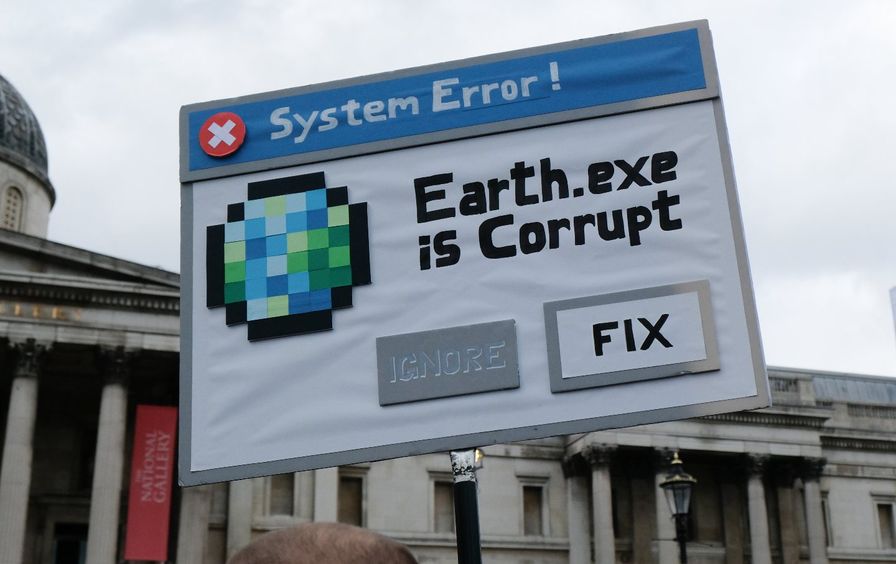Let’s face it, we live in a grim time. This week in New York City, where I’m writing, it was 56 degrees–in early March! That is just not right, however beautiful the day was. It feels like global warming is real, even as we know the scientists say so. And just about everyone we know here at Techonomy is concerned we’re not doing enough about it.
So it was gratifying a few weeks ago in Davos to host the economist and author Andy McAfee talking about his latest book, More from Less, in a session co-hosted with Wipro at its pavilion during the World Economic Forum. McAfee’s thesis, buttressed by an impressive avalanche of data, is that the last 50 years have seen a turnabout of historic proportions in the relationship between resource use and economic growth. And it has also shown how effectively we can respond to environmental catastrophe.

Cassandras like Paul Ehrlich and many earnest environmentalists argued in the 1970s that if we didn’t slow economic growth the earth was doomed. But in fact growth accelerated, even as it decoupled from its longterm relationship with ever-increasing use of physical resources, according to McAfee. For example, energy use rose steadily across the world for 170 years, in tandem with economic growth. But in recent years, it flattened even as economic growth continued. The reasons for the change appear to be several, but all of them are encouraging.
And one of McAfee’s most critical conclusions from all this research is that now we really do have the capacity to turn back the tide on emissions of global warming gasses.
McAfee marshalls impressive data about how bad it got by the early 1970s and what happened next. Air pollution back then was so bad that city dwellers routinely had to check its level to decide whether to stay indoors that day. Cleveland’s Cuyahoga River caught on fire in 1969. The global population of blue whales, once plentiful, had become so decimated that experts estimated only 500 remained in the world’s oceans.
But the first Earth Day in April 1970, in McAfee’s view, marked a major turn in public opinion, and not just in the United States. What followed were years of tightening environmental restrictions and regulations, including in the U.S. the Clean Air Act (1970), the Clean Water Act (1972), and the creation of the Environmental Protection Administration (late 1970).

Regulatory pressure led to industrial innovation and in turn less pollution, says McAfee. And government action was combined over coming decades, fortuitously, with new sources of efficiency, notably from digital technologies.
Meanwhile, global population since 1980 has grown almost 75%, and the global economy is about 2.5 times larger.
But what’s also happened, documented by McAfee in his talk in Davos and in his excellent book, is truly stunning:
-U.S. total agricultural yields have increased steadily. But since 1980, total U.S. use of fertilizer has leveled off, diverging dramatically from agricultural productivity. Water used for farming has declined. And the total amount of land farmed for crops has gone down by an amount equal to the state of Washington!
-Total use of paper and wood products, which had been growing steadily, has leveled and started going down.
-Though American manufacturing has continued to grow, U.S. metals use has declined substantially: the amount of copper used annually has dropped 41% since 1980; steel is down 15%; gold 44.5%; aluminum 32%, and nickel 4%.
-Urban air in developed countries where air pollution regulations were passed is hugely cleaner. “Air in London is cleaner than it has been for hundreds of years,” says McAfee.
-Carbon dioxide emissions, the big gorilla we all worry about, are past their peak and going down.
“To be clear,” said McAfee in Davos, “Global warming is bad. We’re not doing enough to stop it. The line [of CO2 emissions] is not going down quickly enough. I’m not trying to encourage complacency. But we should be aware that the trend has stopped heading in the wrong direction and is now heading in the right direction for the planet.”
What drives McAfee bonkers is that legitimate voices of urgent concern about the climate still often veer towards the assumption that the only answer is to deprioritize growth. A group of global scientists warning of a climate emergency in 2019 called for a “shift from GDP growth and the pursuit of affluence toward sustaining ecosystems and improving human well-being.” And famously, Greta Thunberg said “We are at the beginning of mass extinction, and all you can talk about is money and fairy tales of eternal economic growth.”
In reality, says McAfee, “we have decoupled using resources from growing our economy.” In partial explanation he displays an early-1990s newspaper ad for electronics retailer Radio Shack. It included 15 physical devices for sale. Of them, 13 have vanished almost entirely, sucked into our smartphones: tape recorders, answering machines, walkmans, calculators, and bedside clock-radios among them. “I call it the phenomenon of dematerialization,” he says. “It’s profoundly good news for the planet.”
To get the full flavor and depth of his argument you should watch the video of his compelling presentation. But when it comes to taking action on pollution, which activists often seem to think must include a slow-down in economic growth, McAfee says that in fact “The world’s governments have listened and put in place good regulations that have been effective.”
“Greenhouse gasses are pollution,” emphasizes McAfee. “And once you realize the kind of problem it is, you realize we have solutions to it. It has worked for other kinds of atmospheric pollution.”
We do have to redouble our efforts to regulate and take action against global warming gasses, he says emphatically. He has one particular specific urgent recommendation, which he says is agreed upon by almost all economists: make carbon pollution more expensive, probably with taxes and/or the distribution of carbon credits.
“I get pretty confident we can solve all our planetary problems while continuing to grow,” he concludes. “The past half century shows us this.” It’s refreshing–and surprising–to hear from an informed and highly techonomic optimist.
















